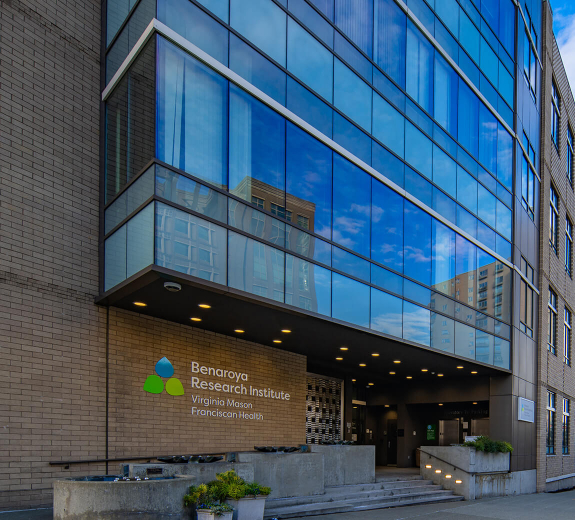Benaroya Research Institute at Virginia Mason (BRI) recently launched an innovative Type 1 diabetes research study with an experimental medicine called canakinumab. This medicine is a monoclonal antibody designed to neutralize some of the inflammation associated with loss of the cells that make insulin. The study will investigate whether this experimental medicine will help people with newly diagnosed Type 1 diabetes continue to make some of their own insulin.
The study is sponsored by TrialNet through the National Institute of Diabetes and Digestive Kidney Diseases (NIDDK). BRI is the Pacific Northwest coordinating site for TrialNet studies and the only site in this area offering the trial. The Diabetes Clinical Research Program at Benaroya Research Institute is an international leader in Type 1 (autoimmune) diabetes research. The program's goal is to help families with Type 1 diabetes by investigating ways to prevent diabetes, finding new approaches of diagnosing the disease in its earliest stage to optimize the potential for successful treatment, and testing innovative new therapies.
Up to three million Americans have Type 1 diabetes and worldwide incidence of the disease is growing, with the greatest increase in children under five years old. In Type 1 diabetes, the body’s immune system attacks and destroys the cells that make insulin. People with this disease must take insulin to stay alive. They must also balance their food intake and exercise. People with diabetes can suffer from complications such as nerve damage, kidney failure, loss of eyesight and an increased risk of heart disease and strokes.
"One of our goals for children and adults newly diagnosed with Type 1 diabetes is to find a way to save their insulin producing cells," says Srinath Sanda, MD, a clinical investigator at BRI who served on the canakinumab design and development groups. "When a person is first diagnosed with Type 1 diabetes, about 80 percent of these cells, called beta cells, have been destroyed. About 20 percent of their beta cells remain. We’ve found that patients who keep these remaining cells longer have a lower rate of complications and better management of their diabetes."
Canakinumab has been approved by the Federal Drug Administration (FDA) for rare inflammatory diseases. The medication has been shown to bind to a specific inflammatory protein called IL-1β and neutralize its bioactivity. IL-1β has a toxic effect on beta cells. Other medications that inhibit the action of IL-1β have been shown to improve insulin secretion and control blood sugar levels in patients with Type 2 diabetes.
BRI scientists have studied ways to track changes in the immune system of people with Type 1 diabetes treated with a similar drug. Dr. Sanda and colleagues used a drug called anakinra (a cousin drug to canakinumab) in adults with Type 1 diabetes. In a paper published in the August 2010 issue of Clinical Immunology, BRI scientists demonstrated how they found changes within the immune system in patients treated with anakinra. This discovery will be applied to the larger clinical study to help evaluate the activity of canakinumab in preserving insulin producing cells.
The "Canakinumab Study in Individuals with Newly Diagnosed Type 1 Diabetes" is currently open to newly diagnosed diabetes patients from 6 to 45 years old who qualify for the study. For more information, call 1-800-877-4187 or visit BenaroyaResearch.org/diabetes-research/find-study/canakinumab.



